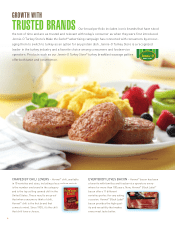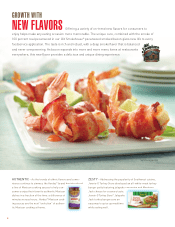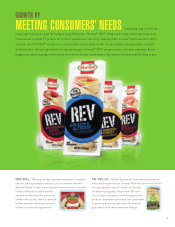Hormel Foods 2013 Annual Report Download - page 16
Download and view the complete annual report
Please find page 16 of the 2013 Hormel Foods annual report below. You can navigate through the pages in the report by either clicking on the pages listed below, or by using the keyword search tool below to find specific information within the annual report.EXECUTIVE OVERVIEW
Fiscal 2013: Hormel Foods achieved record sales and earn-
ings for fiscal 2013. Sales grew more than 6 percent to $8.8
billion with all five reporting segments recording top line
increases. Net earnings for the year were $526.2 million, an
increase of 5.2 percent over 2012, with four of five segments
contributing to the growth. Earnings per diluted share were
$1.95, a 4.8 percent improvement compared to last year.
Significant contributions by both the Grocery Products and
International & Other segments drove top and bottom-line
growth. Double-digit gains for these segments were sup-
ported by the addition of the SKIPPY® peanut butter busi-
ness, acquired at the beginning of the second quarter. The
International & Other segment also benefitted from continued
strength in export sales of the SPAM® family of products and
fresh pork, along with improved profitability by the Company’s
China operations. The results for the Refrigerated Foods
segment improved slightly over last year, as the impact of
higher pork input costs weighed on the value-added Meat
Products and Foodservice businesses. Pork operating mar-
gins improved from the challenging environment last year.
Significantly higher grain costs and lower commodity turkey
meat prices combined to drive lower results for the Jennie-O
Turkey Store segment. Momentum from continued growth
in value-added products, along with performance gains and
expense reductions in the live production supply chain more
than offset these year-over-year higher costs during the
last quarter of the fiscal year. Strong results in the first nine
months of fiscal 2013 drove full year operating profit gains for
Specialty Foods. Specialty Foods net sales and segment profit
were negatively affected in the last quarter of the year, due
to the expiration of the agreement allowing Diamond Crystal
Brands to sell certain sugar substitutes in foodservice trade
channels. General corporate expense was higher on increased
salary, pension, and insurance expense while net interest and
investment expense increased due to lower interest income.
Our financial performance continued to generate substantial
operating cash flows. We announced our 48th consecutive
year of dividend increases, raising our dividend rate by 17.6
percent for fiscal 2014, and repurchased 1.7 million shares of
common stock in fiscal 2013, spending $70.8 million.
Fiscal 2014 Outlook: In fiscal 2014, we expect to deliver year-
over-year improvements in both sales and earnings. More
favorable grain and turkey commodity costs are expected,
along with more normalized pork operating margins. We
expect the Grocery Products, Refrigerated Foods, Jennie-O
Turkey Store, and International & Other segments to deliver
year-over-year earnings growth, while our Specialty Foods
segment is projected to post lower earnings as it rebuilds
after the expiration of a contract representing a portion of
its sugar substitute business. We will benefit from a full year
of contributions from the SKIPPY® peanut butter business.
Building our branded, value-added product lines and deliver-
ing product innovation will be continued priorities which will
allow us to provide consumers with great tasting, convenient,
and healthy food options at a good value. Our strong balance
sheet and free cash flow will provide the opportunity to build
our business through internal expansion or strategic acquisi-
tions, as well as continue to return cash to our shareholders.
CRITICAL ACCOUNTING POLICIES
This discussion and analysis of financial condition and
results of operations is based upon the consolidated financial
statements of Hormel Foods Corporation (the Company),
which have been prepared in accordance with U.S. generally
accepted accounting principles (GAAP). The preparation of
these financial statements requires the Company to make
estimates and judgments that affect the reported amounts of
assets, liabilities, revenues and expenses, and related disclo-
sure of contingent assets and liabilities. The Company eval-
uates, on an ongoing basis, its estimates for reasonableness
as changes occur in its business environment. The Company
bases its estimates on experience, the use of independent
third-party specialists, and various other assumptions that are
believed to be reasonable under the circumstances, the results
of which form the basis for making judgments about the carry-
ing values of assets and liabilities that are not readily apparent
from other sources. Actual results may differ materially from
these estimates under different assumptions or conditions.
Critical accounting policies are defined as those that are
reflective of significant judgments, estimates, and uncer-
tainties, and potentially result in materially different results
under different assumptions and conditions. The Company
believes the following are its critical accounting policies:
Inventory Valuation: The Company values its pork inventories
at the lower of cost or USDA market prices (primal values).
When the carcasses are disassembled and transferred from
primal processing to various manufacturing departments,
the primal values, as adjusted by the Company for product
specifications and further processing, become the basis for
calculating inventory values. Turkey raw materials are repre-
sented by the deboned meat quantities. The Company values
14
Management’s Discussion and Analysis of Financial Condition
and Results of Operations
























